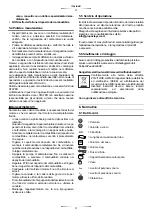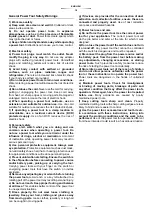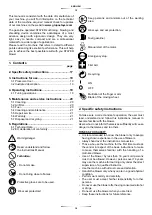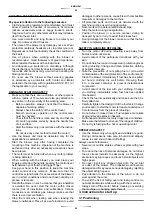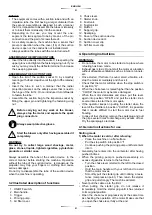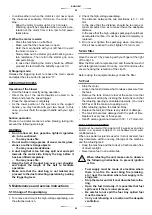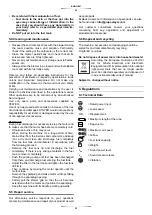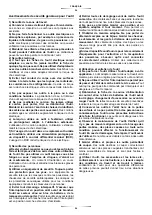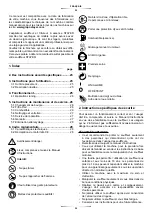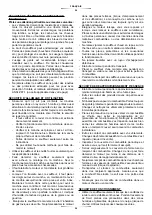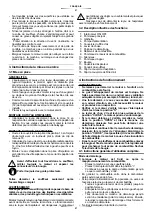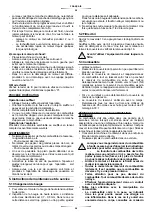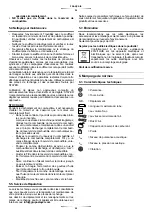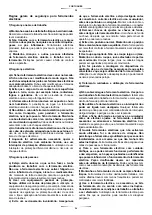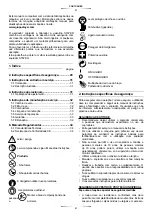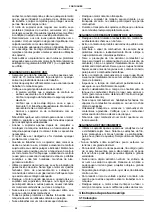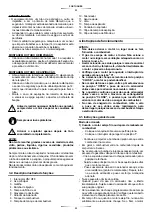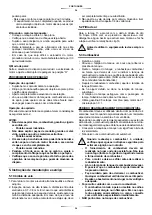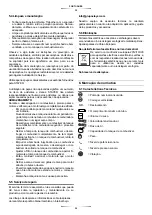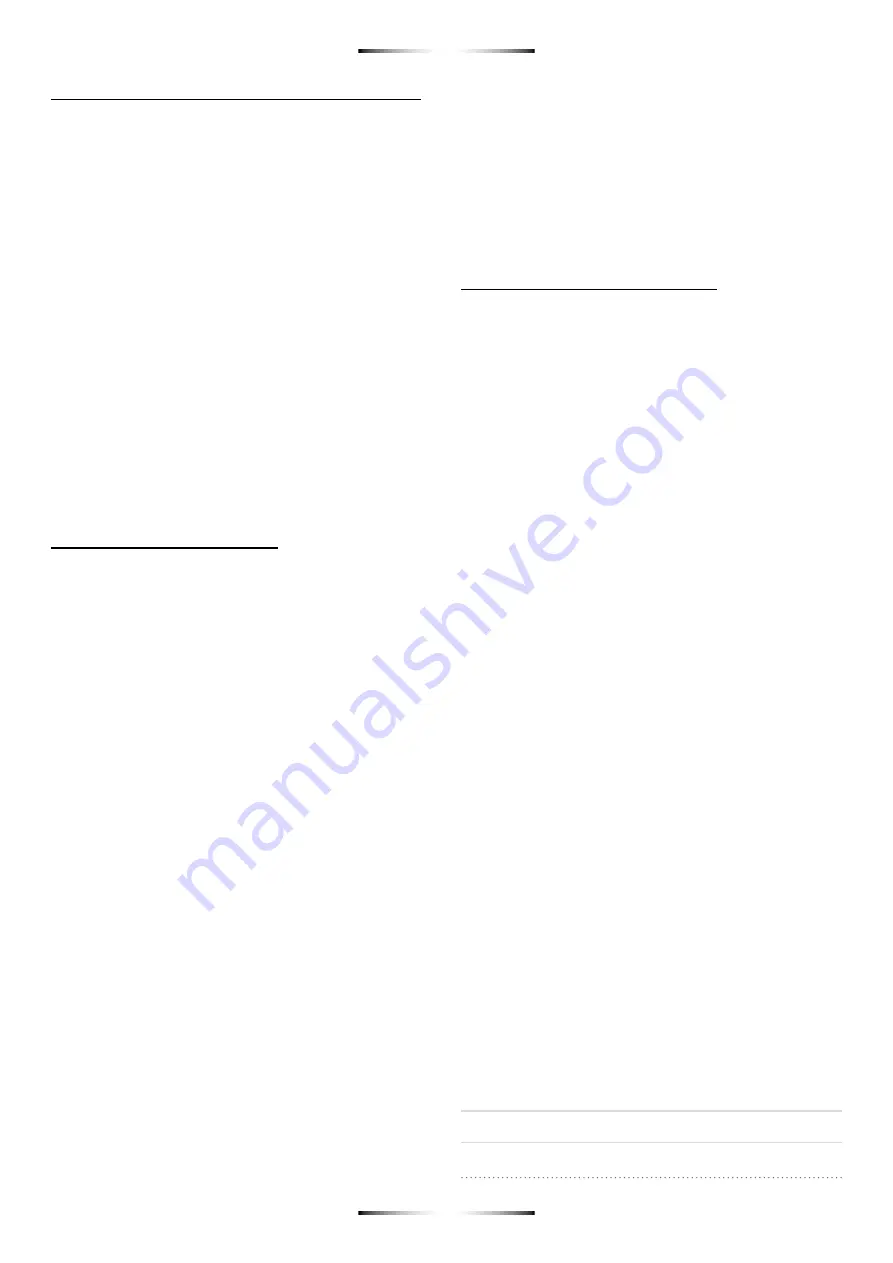
ENGLISH
20
20
CLOTHING SAFETY AND INDIVIDUAL PROTECTION
Pay special attention to the following measures
• Clothing must be resistant and comfortable, but it must
allow a complete freedom of movement. Avoid wide
jackets, excessively wide or saggy trousers, scarfs,
long loose hair or any other element that may introduce
itself into the air inlet.
Use work overalls and long trousers to protect your
legs. Do not wear short trousers.
• The noise of the blower may damage your ear. Wear
protectors (earplugs, headsets, etc.) to protect your ear.
Regular users must periodically check the condition of
their ears.
• Use of gloves when working with the blower is
recommended. Good footwear is of great importance.
Wear resistant footwear with anti-skid sole.
• An adequate eye protection is mandatory. Although
the discharge is not directly directed towards the user,
rebounds and bounces may occur when handling the
blowing machine.
• Do never use the blower without wearing goggles
or adequate eye protectors with frontal and lateral
protection that comply with regulation ANSI Z 87.1 (or
that applicable in your country).
USING AND STARTING SAFETY
• Make sure that there are no children or other persons
within a radius of 15 meters and also pay attention to
any animal in the proximity of the working area.
- Before operation, always check that the blower is
capable of working safely.
- Always check the safety of the control lever:
- Smooth and easy operation of the control lever
must be checked.
- Check that the handle is clean and dry and that the
I-O switch operates correctly. Keep the handle free
of oil and fuel.
- Start the blower only in accordance with the instruc-
tions.
Do not use any other method to start the motor!
• Use the blower and tools as delivered only for the
applications as established.
• Start the blower only after having completed the
mounting of the machine. Operation of the machine is
authorized only after all necessary accessories have
been placed.
• The motor must be turned off when any motor problem
is being detected.
• When working with the blower, you must place your
fingers embracing the handle, keeping the control lever
held between your thumb and trigger finger.
Keep your hand in this position to keep the machine
under control at any moment. Make sure that the
control lever (and holder for accessories of the blower)
are in perfect conditions and do not have humidity, oil,
grease or tar spots.
• Handle the blower in such a manner that gas inhalation
is avoided. Do never start the motor within closed
rooms (risk of intoxication and suffocation). Carbon
monoxide is an odorless gas. Always make sure that
there is a correct ventilation.
• Stop the motor when resting and when leaving the
blower unattended. Place it at a safe location to avoid
damages to other persons, cause fire with combustible
materials or damages to the machine.
• All protective parts and covers as delivered with the
machine must be used during operation.
• Never work with a deteriorated exhaust pipe.
• Stop the motor during transportation.
• Position the blower in a secure manner during its
transport by car or lorry to avoid that it loses fuel.
• During transport of the blower, make sure that the fuel
tank is completely empty.
SAFETY IN GASOLINE REFUELING
• Turn the motor off during refueling, keep away from
flames and do not smoke.
• Avoid contact of the petroleum derivatives with your
skin.
• Do not inhale fuel vapor. Always wear protective gloves
during refueling. Change and clean protective clothing
at periodic intervals.
• Take the precaution of not spilling fuel or oil to avoid
contamination of the soil (protection of the environment).
Clean the blower immediately if fuel has been spilled.
Let humid clothing dry well before throwing them
into a covered container to prevent instantaneous
combustion.
• Avoid contact of the fuel with your clothing. Change
you clothing immediately when fuel has been spilled
(fire hazard).
• Check the fuel lid periodically and make sure that it is
firmly attached.
• Carefully tighten the closing lid of the fuel tank. Change
your location to start the motor (at least at a distance of
3 meters away from the place of refueling).
• Do not refuel in closed rooms. Fuel vapors accumulate
at ground level (explosion hazard).
• Do transport and store fuel only in approved containers.
Make sure that stored fuel is out of the range of children.
• Do not try refueling with a hot or operating motor.
OPERATION SAFETY
• Use the blower only when light and visibility are good.
During cold seasons, take care in humid and slippery
areas, ice and snow (hazard of falling).
Always use safe footwear.
• Never work on little stable surfaces or plots with great
slope.
• To reduce the risk of personal damages, do not direct
the air stream towards to passers-by, as the high air
pressure may injure eyes and launch small objects at a
high speed.
• Do never insert any strange object into the air inlet
or outlet of the blower. The propeller would become
damaged and it may cause serious damage by rejecting
the object at high speed.
• Pay attention to the direction of the wind i.e. do not
work against the wind.
• To avoid the risk of falling over and losing control, do
not walk backwards while working with the machine.
• Always turn off the motor before cleaning or servicing
the machine or changing parts thereof.
3. Instructions for start up
3.1 Positioning












